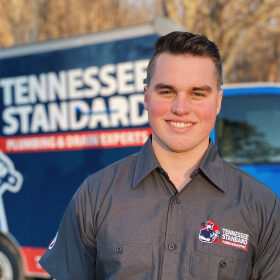Hot Water Shortages
There is nothing more annoying than running out of hot water in the middle of a shower! Here’s the good news: “Running out of hot water does not have to be a normal thing!” Before we get into the solutions, here are the most common causes for running out of hot water:
With tank-style water heaters, the hot water typically runs out because of a problem with the heat source, or because of a lack of volume in the tank. If the heat source is the problem, the elements or burner may need to be replaced depending on whether the heater is gas or electric. If the volume of hot water is the problem, either the tank is full of sediment and scale (likely if the heater is ten years old) or the tank is just undersized for the hot water demands placed on the system.
Properly sized tankless water heaters only run out of hot water when a component is malfunctioning and needs to be replaced. Tankless heaters need to be diagnosed by a tankless heater specialist to nail down the exact part to replace.
This problem requires a different solution depending on what kind of water heater you have. Below are some of the most common explanations for each one:
Electric Heaters
Electric heaters are known to build more sediment and scale than any other kind of water heaters. This is because the electric elements that heat the water create extreme heat right around the elements that create a catalyst for pulling hardness out of the water and depositing it into the tank. Often the elements need to be replaced to solve this problem.
Gas Water Heaters
Gas Water Heaters need to have their burner cleaned to keep the flame heating the water consistently. The other thing that could be causing a gas heater to heat inconsistently is the gas thermostat or control valve may not be reading temperature correctly. If the heater is turned all the way up, and the temperature still inconsistent or not hot enough, something is wrong.
Bad Water Heater Temperatures
International Plumbing Code requires a maximum temperature of 120 Degrees Fahrenheit at showers and hand faucets. At 120 Degrees, it would take five minutes of direct skin contact to cause a3rd degree burn. At 127 Degrees, it only takes 1 minute to cause a 3rd degree burn. At 140 Degrees, it takes only 5 seconds to create a 3rd degree burn! At Tennessee Standard Plumbing, we generally set our water heaters at 125 Degrees so that by the time the hot water gets to the faucet or shower, thermal loss (the amount of heat that escapes the water while running through the pipe) drops the temperature 5 degrees or more and the homeowner gets 120 degree water at their shower. This guarantees a hot shower while mitigating the risk of scalding for the user.
Why it Takes so Long for Your Water to Heat
A full tank of cold water can take quite some time to heat up. Properly working electric heaters can usually go from cold to fully hot in about an hour. Gas tank heater can usually get fully hot in about half the time because their recovery rate is much higher. Tankless heaters heat water instantly and are almost always the best solution for endless hot water. If your water heater seems to be taking longer than this to heat up or if you run out of water before even finishing a shower or two, something is wrong with the water heater.



